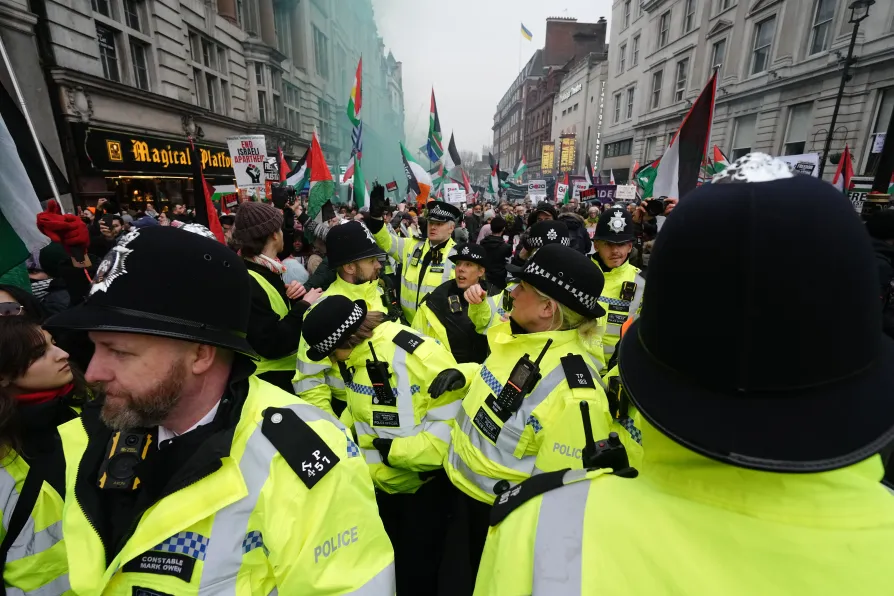Rubio's disturbing speech in Munich exposed the West's brutal plans — more imperialism, more colonialism, more white supremacy, says ROGER McKENZIE
The government cracking down on something it can’t comprehend and doesn’t want to engage with is a repeating pattern of history, says KEITH FLETT

 Police officers watch as people take part in a national march for Palestine on Whitehall in central London, January 18, 2025
Police officers watch as people take part in a national march for Palestine on Whitehall in central London, January 18, 2025
THE government is cracking down on dissent and trying to criminalise it. Whether its investigating Bob Vylan and Kneecap for alleged criminal offences at Glastonbury, prosecuting some of those involved with a January 18 2025 central London march on Palestine and now banning the peaceful direct-action campaigners Palestine Action as “terrorists.”
Whatever words Labour politicians may use the aim is clearly to delegitimise opposition to Israel’s genocide in Gaza and to make people fearful of the consequences of protesting.
It’s not a unique situation. In fact the template was set by a peaceful protest for the vote in central Manchester on August 16 1819. It was not peaceful on the side of the state, however, as the yeomanry, men on horseback, cut down, killed and injured protesters.
The reason, in hindsight, is clear. While the government was used to gatherings of people for fairs and other social events, it was faced with a mass political demonstration. There was no conception as to what might happen, but the fear was of violence and revolt.
The chair of the bench that committed the sole speaker at Peterloo, Henry Hunt, for trial said: “Assembled, with such insignia and in such a manner, with the black flag, the bloody dagger with ‘equal representation or death’ … they came in a threatening manner, they came under the banners of death, thereby showing they meant to overturn the government.”
Except the Peterloo protesters were not a death cult, they simply wanted the democratic right to vote. The banners and words were rhetoric not an intent of revolution.
The government then went further: one of the six Acts, which were actually formally passed in December 1819, was the Seditious Meetings Act.
Under the Act all meetings of more than 50 people — in reality no more than 49 persons — were allowed. This included any meeting “for the purpose … of deliberating upon any public grievance, or upon any matter or thing relating to any trade, manufacture, business, or profession, or upon any matter in church or state.” The only exception were meetings called by an “authorised official.”
In addition a meeting of people in one specific area could be called provided permission was given by a justice of the peace. He of course required six days’ notice. At such meetings no banners, flags or emblems of any sort were allowed.
While the Act was repealed in 1824, a related limit of no more than 49 delegates at any representative gathering remained in place through the Chartist period up to 1848.
In order to try to avoid official interference in protest meetings, these were often held out of town in remote rural spots well away from the reach of the authorities.
The pattern of the government cracking down on something it can’t comprehend and doesn’t want to engage with is repeated in 2025.
A Times editorial after Glastonbury, noting that the crowd for Bob Vylan had joined in with the cry to “Death to the IDF,” suggested that clearly most of them did not understand what they were apparently agreeing with. Why, in the view of the Times, would people want to see the end of an armed force that was busy pursuing a genocide? It could not understand.
The popular movements that developed after Peterloo from trade unionism to Chartism were successful in reclaiming the ability to democratically organise and protest. The government continued to attack industrial disputes, but it was exceptional for a political demonstration to be attacked.
That surely is a lesson for today — to keep on keepin’ on, having in mind the words of the other Bob — Dylan — who sang in the Times They Are Changin’ “don’t criticise what you can’t understand.”
Keith Flett is a socialist historian.

It’s not just the Starmer regime: the workers of Britain have always faced legal affronts on their right to assemble and dissent, and the Labour Party especially has meddled with our freedoms from its earliest days, writes KEITH FLETT

Despite declining to show Kneecap’s set, the BBC broadcast Bob Vylan leading a ‘death to the IDF’ chant — and the resulting outrage has only amplified the very message the Establishment wanted silenced, writes LINDA PENTZ GUNTER

BBC accused of silencing acts at Glastonbury for standing in solidarity with Palestine










